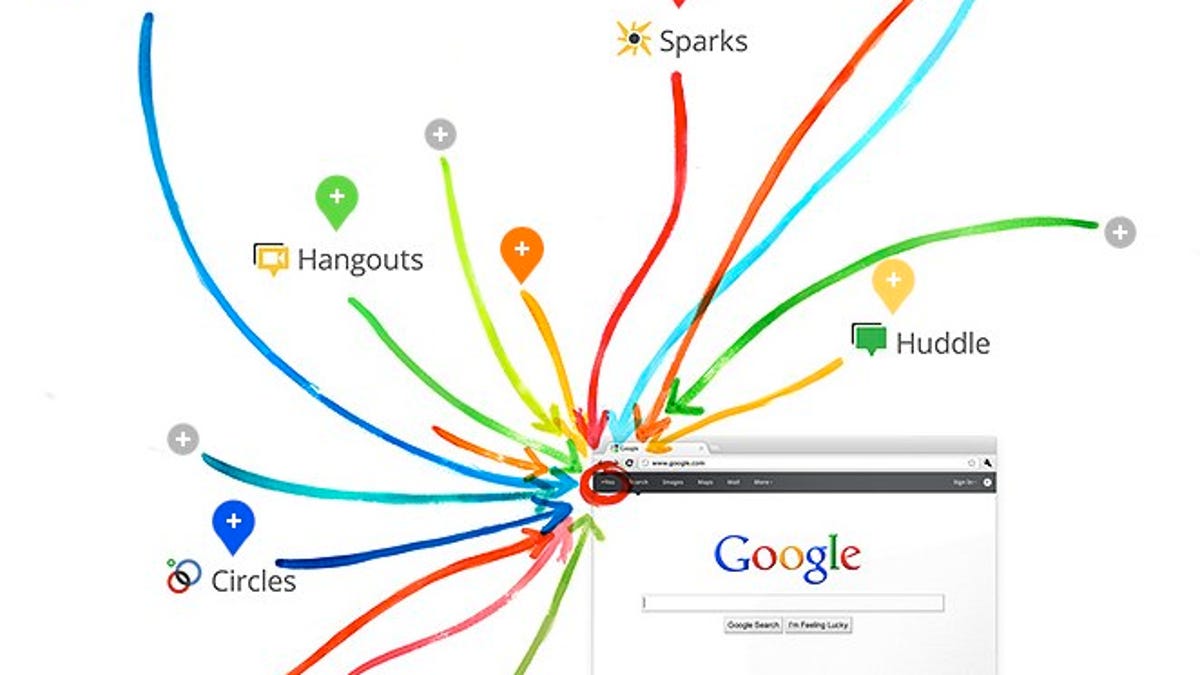Google resets social agenda with Google+
Launching a small "field trial," the Web giant circles its way back toward the social sphere with its Google+ project. Can this win the friends that Buzz failed to gather?

Google is taking another stab at the social space with a new service, called Google+.
For now, Google is quick to call Google+ a "project," and acknowledged that the social service still has "rough edges." However, it currently has a host of features to help people communicate over the Web with friends and family.
Google+ is designed around "Circles" that allow users to group people within their social sphere into different categories. Google says that the people you tend to meet up with on Saturday nights, for example, can be grouped into their own category, while parents can be placed into another. You can then decide to share only certain information with different Circles.
In addition, the social service includes a feature called Hangouts that lets you find others who are "hanging out" on the Web. If you decide to join a given hangout, you'll be able to engage in a video chat with the others there. Google+ also comes with an Instant Upload option that automatically uploads all photos and videos from your phone to your profile. From there, you can decide who to share that content with.
A Sparks feature in Google+ lets users input interests and then receive "something cool" related to the specific topic, including news, videos, and other content. The service's Huddle option allows for group chatting on mobile devices.
Though Google acknowledged that its social service is currently in a "field trial period," comparisons are already being drawn to the company's past attempts to build a top social network.
Related links:
• Why you're a pawn in Facebook vs. Google
• Facebook planning IPO on $100 billion valuation?
• CBS MoneyWatch: Facebook value 'plummets' to $70 billion
• Facebook's antisocial PR pitch against Google
• CBS News: Google kool-aid infiltrates the Googleplex
Google's first major foray into the social networking world came byway of Orkut, a service that has seen some success outside the States, but has largely been ignored by U.S. users.
Last year, Google tried its luck again with the launch of its Buzz social network. Upon its launch, Buzz came under fire from users who criticized the service for violating their privacy by automatically making some of their contacts public. The company quickly scrambled to address the problem, but it didn't make much of a difference: like Orkut, Buzz has been unable to compete with Facebook.
Mano a mano with Facebook
Even so, it's becoming clearer that both Google and Facebook see each other as threats.
Google is an online-advertising juggernaut, easily outpacing all others in that market. However, as Facebook's user base continues to grow--most estimates suggest the company has more than 600 million active users--advertisers are warming to the idea of promoting their brands on the social network.
In fact, research firm eMarketer reported earlier this year that Facebook generated $1.86 billion in advertising revenue in 2010. This year, the company expects Facebook to make $4 billion in advertising revenue. In 2012, its advertising revenue could reach $5.7 billion, the company said.
Aside from Google's advertising business, Facebook has also taken aim at the search giant's social strategy.
In May, public relations firm Burson-Marsteller revealed that Facebook had hired it to initiate a campaign against Google's Social Circle feature, which lets users see publicly available information on those they're connected with in Google Chat and Contacts. On Facebook's behalf, the PR firm said that Google was "cataloging and broadcasting" the personal information of users in Social Circle "without their permission."
Though Facebook's involvement was initially kept secret, the company told CNET in May that it stood by its decision to launch a PR campaign against Google.
"You and your readers can look at the feature and decide if they have approved of this collection and use of information by clicking here when their Google account is open," a Facebook spokesperson said in an e-mailed statement to CNET. "Of course, people who do not have Gmail accounts are still included in this collection but they have no way to view or control it."
For its part, Google didn't comment on Facebook's campaign. But now, the search company is firing another shot over Facebook's bow with Google+.
Google+ is available now to a small number of users. Those who are interested in eventually joining can sign up on the project's page and wait to be notified when invites are available.
Check out the video below to see Rafe Needleman's early thoughts on Google+ and how it's better--and worse--than Facebook.

